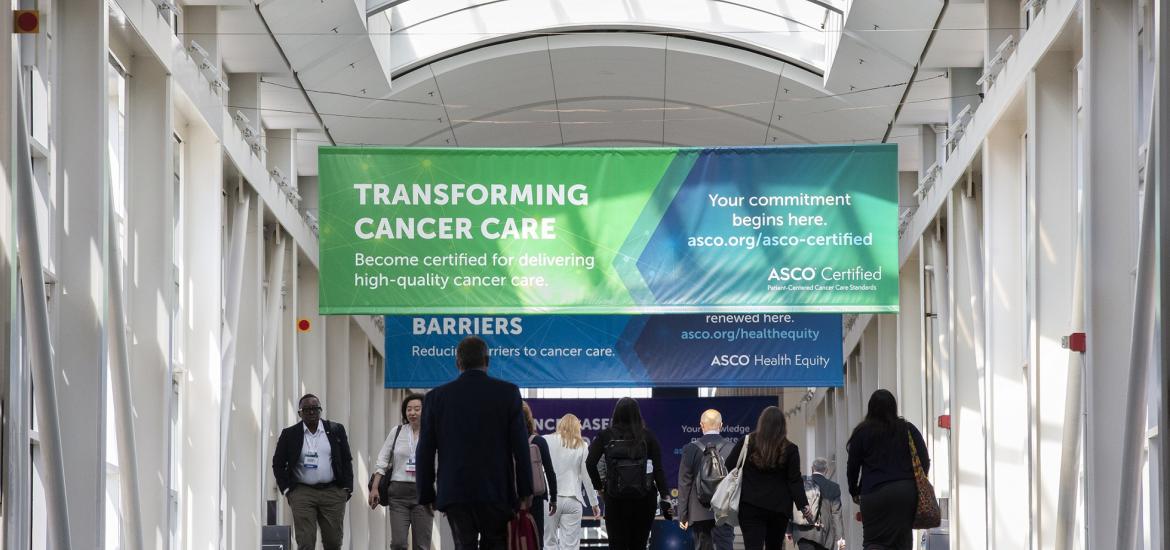
ASCO 2025 – Trodelvy heads for the front line
Gilead’s TROP2 ADC sets the bar for Astra/Daiichi’s Datroway in first-line TNBC.
Gilead’s TROP2 ADC sets the bar for Astra/Daiichi’s Datroway in first-line TNBC.

Gilead’s TROP2-targeting ADC Trodelvy, already approved for third-line triple-negative breast cancer, looks like it’s heading for earlier use, ASCO heard on Saturday. The Ascent-04 trial found a convincing progression-free survival benefit with Trodelvy plus Keytruda, versus Keytruda plus chemo, in front-line, PD-L1-positive patients.
This, as well as an early trend towards an overall survival improvement, had discussants at a pre-ASCO press briefing heralding the data as “potentially practice changing”, seemingly untroubled by the fact that the control arm underperformed historical data. In first-line TNBC Trodelvy is ahead of AstraZeneca and Daiichi Sankyo’s similarly acting Datroway, which will see results from the analogous Tropion-Breast05 trial next year.
The latest data are a boost for Trodelvy, which has seen its fair share of disappointments. However, the drug, which sold $1.3bn in 2024, still has a long way to go to justify the $21bn Gilead spent on its originator, Immunomedics.
In Ascent
Keytruda plus chemo is the current standard of care in first-line TNBC patients with PD-L1 expression of 10% or higher – the population Gilead targeted in Ascent-04.
The study found a “statistically significant and clinically meaningful” improvement in PFS with Trodelvy plus Keytruda versus Keytruda plus chemo, with respective medians of 11.2 and 7.8 months.
Still, mPFS in the control arm fell short of the 9.7 months seen with Keytruda plus chemo in PD-L1 ≥10% expressers in the Keynote-355 trial.
Data from Ascent-04 in first-line PD-L1 ≥10% TNBC
| Trodelvy + Keytruda | Keytruda + chemo | |
|---|---|---|
| mPFS | 11.2 months | 7.8 months |
| HR=0.65; p<0.001 | ||
| mOS | NR | NR |
| HR=0.89 | ||
| ORR | 60% | 53% |
| mDoR | 16.5 months | 9.2 months |
| Serious TEAEs | 38% | 31% |
| TEAE-related dose reductions | 35% | 44% |
| TEAE-related discontinuations | 12% | 31% |
| TEAE-related death | 3% | 3% |
Source: ASCO 2025.
Ascent-04 also saw an “early trend” towards an overall survival benefit, despite the fact the analysis was carried out at only 26% maturity, and that 43% of control patients had crossed over to receive second-line Trodelvy monotherapy.
As for adverse events, the press conference discussant, Dr Jane Meisel of Emory University, said it was reassuring that no additional toxicity had been seen with the Trodelvy/Keytruda combo versus that observed with either agent alone.
Presenting the data, Dana-Farber Cancer Institute’s Dr Sara Tolaney conceded a higher-number of treatment-related serious adverse events with Trodelvy plus Keytruda, but noted fewer dose reductions and discontinuations.
ASCO’s chief medical officer, Dr Julie Gralow, concluded that the results should move Trodelvy into earlier TNBC. Gilead has said the data will be discussed with regulators, but hasn’t provided a timeline.
The company also just reported a win in Ascent-03, in first-line TNBC patients ineligible for PD-(L)1 inhibition. However, while Gilead noted a “highly statistically significant and clinically meaningful improvement” on PFS, it merely stated that “no OS detriment” had been observed – which might not bode as well for this trial.
2815













